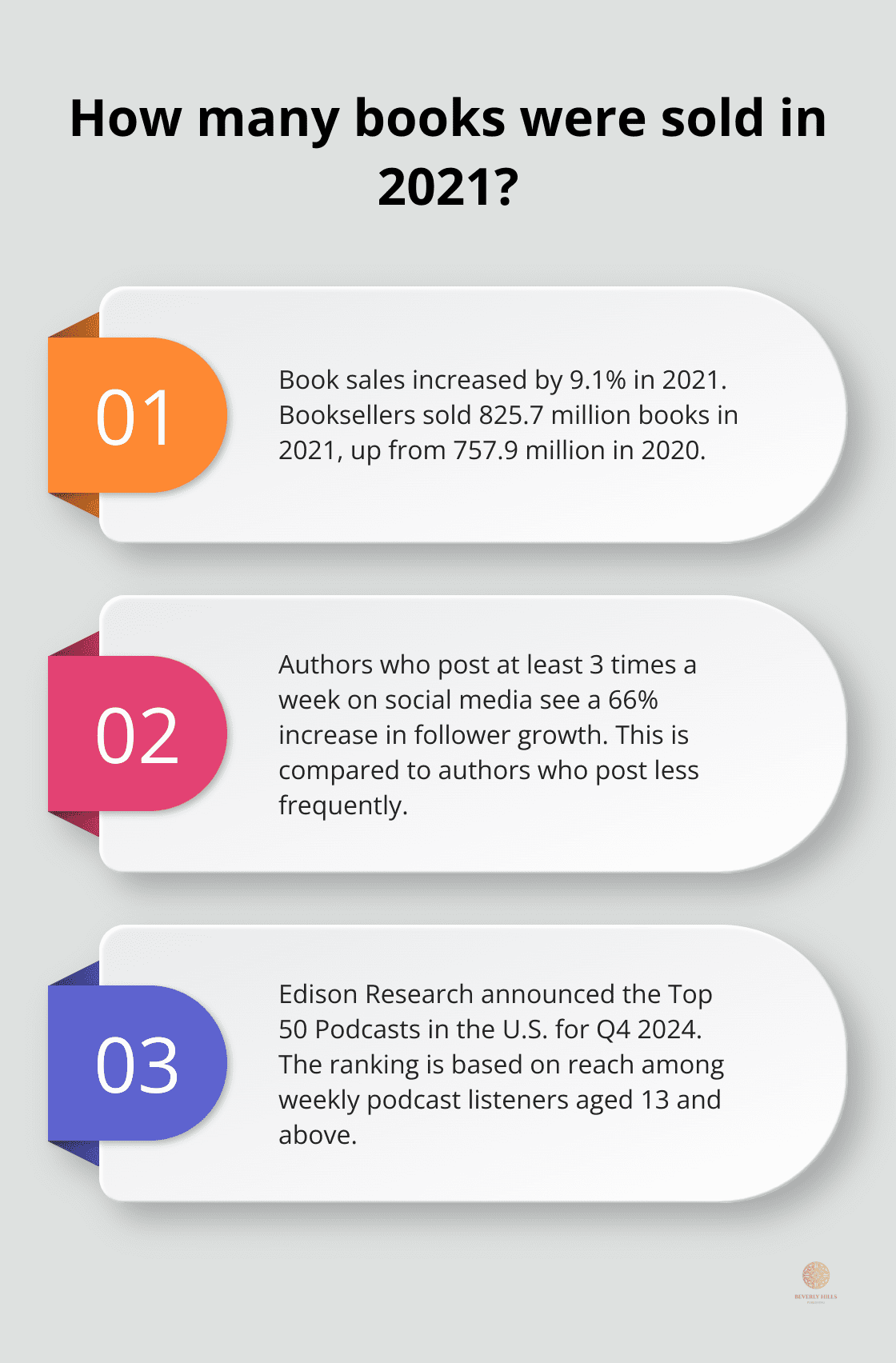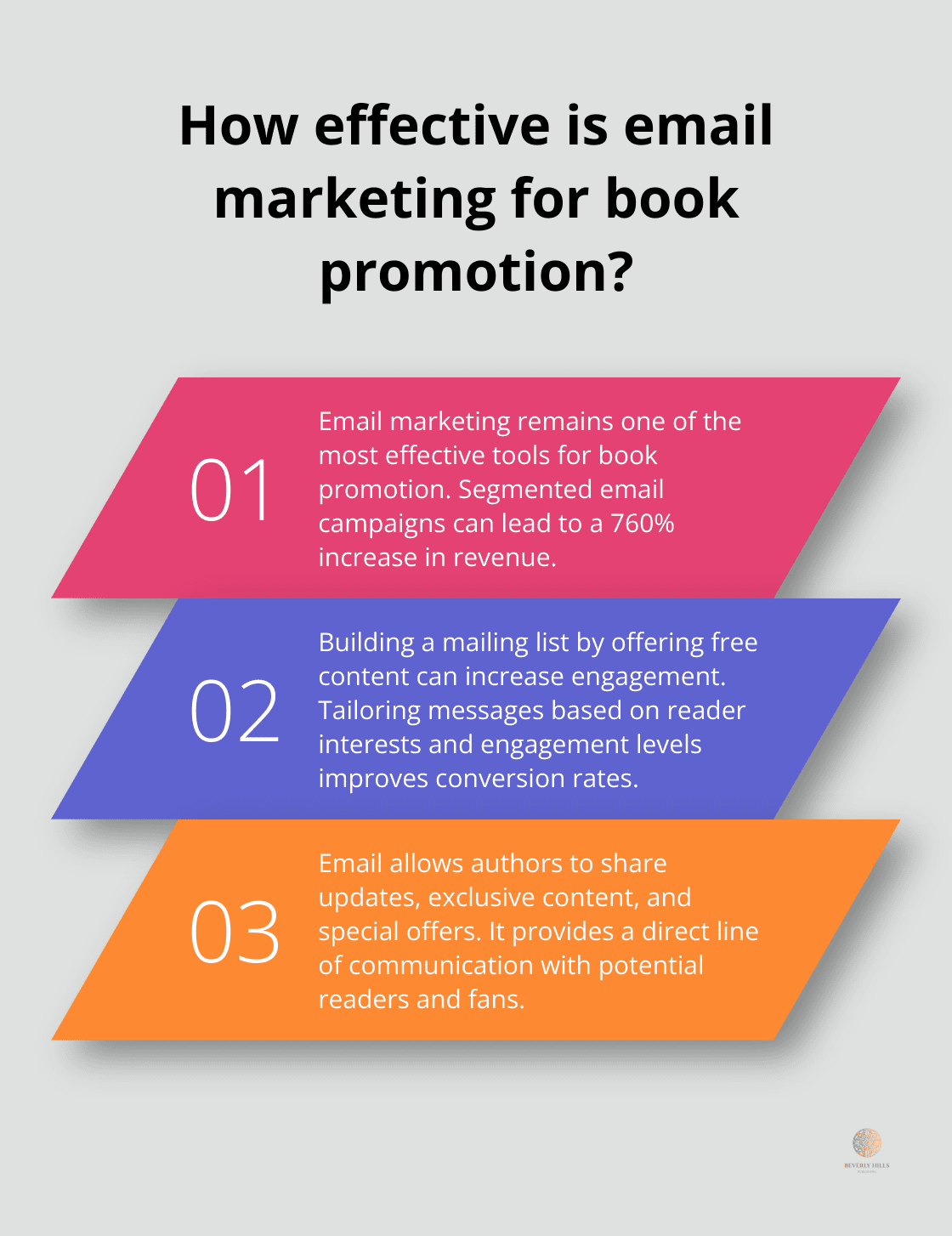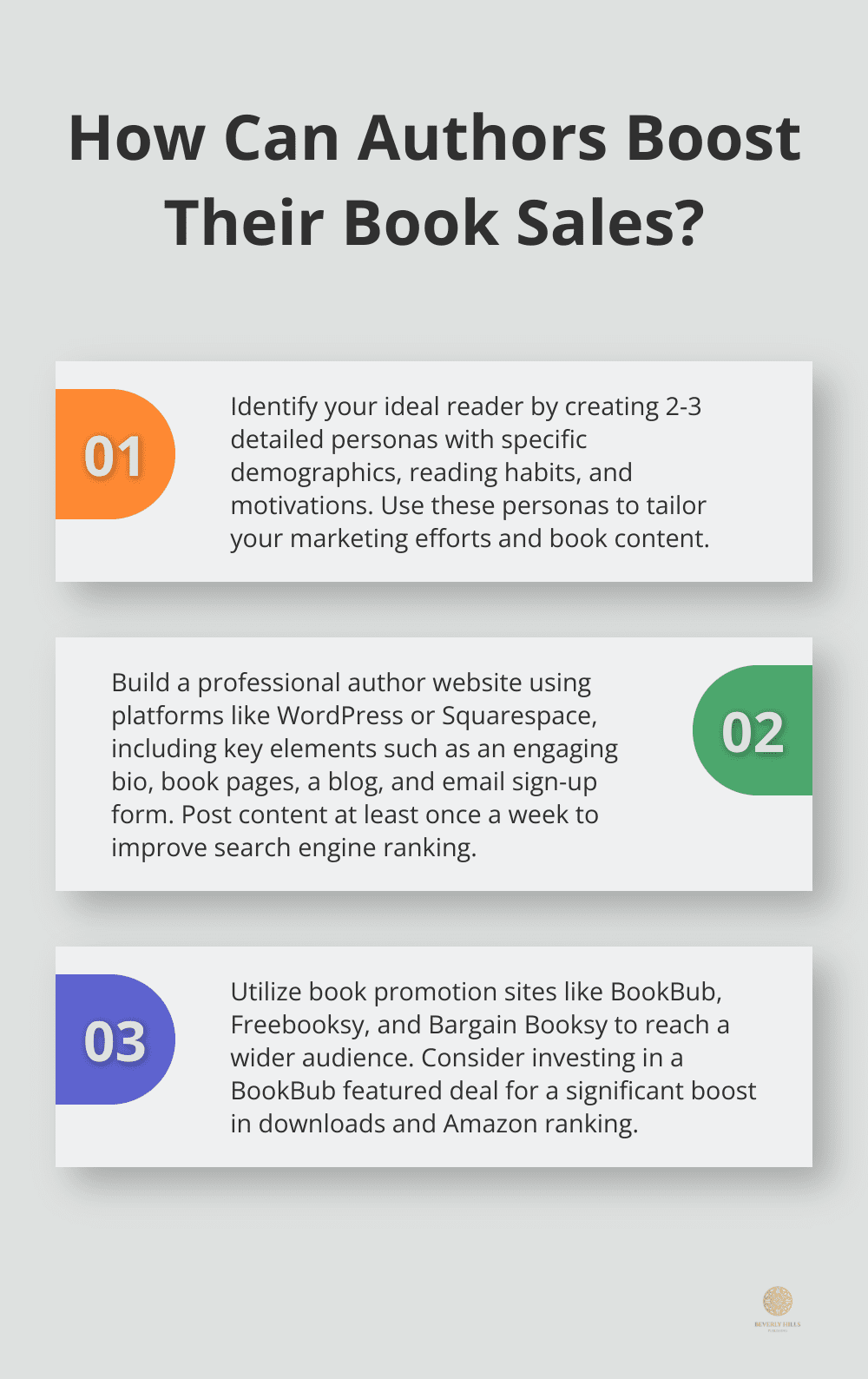At Beverly Hills Publishing, we understand the challenges self-published authors face when marketing their books.
Effective book marketing can make the difference between obscurity and success. That’s why we’ve compiled a comprehensive guide on how to market your self-published book effectively.
Our book marketing services for self-published authors are designed to help you reach your target audience and boost your sales.
Who Is Your Ideal Reader?
Uncover Your Reader’s Demographics
Identifying your target audience forms the foundation of effective book marketing. Many authors struggle to reach readers because they haven’t pinpointed their audience. Let’s explore how to identify your ideal reader and tailor your marketing efforts.

Start by examining your book’s core themes. A romance novel set in Victorian England likely appeals to female readers interested in historical fiction. For non-fiction works, consider the problem your book solves or the knowledge it imparts. A retirement planning guide might attract adults nearing their 50s and 60s.
Tools like Facebook Audience Insights or Google Analytics provide valuable data on people interested in topics related to your book. These platforms offer information on age ranges, locations, and even income levels of potential readers.
Explore Reading Habits
Understanding how your target audience consumes books is essential. Do they prefer e-books or physical copies? Are they audiobook enthusiasts? A 2021 Pew Research Center study revealed that 30% of Americans read e-books, while 25% read print books. This information can guide your publishing format decisions.
Visit popular book forums and social media groups related to your genre. Observe discussions about reading preferences, favorite authors, and book-buying habits. This firsthand insight proves invaluable for shaping your marketing approach.
Create Detailed Reader Personas
Bring your ideal readers to life by creating 2-3 detailed personas that represent different segments of your target audience. Assign each persona a name, age, occupation, and backstory. Include their motivations for reading, preferred book formats, and where they discover new titles.
For example:
“Sarah, 35, works as a busy marketing executive who listens to business audiobooks during her commute. She values practical advice and often shares book recommendations with her professional network.”
These personas will guide your marketing efforts, helping you craft messages that resonate with real people (not just abstract demographics). The more specific you are, the more effective your marketing will be.
Apply Your Audience Insights
Use your newfound audience knowledge to inform every aspect of your book marketing strategy. From crafting compelling book descriptions to designing eye-catching covers, let your understanding of your ideal reader shape your decisions.
Consider where your target audience spends their time online and offline. If they’re active on Instagram, focus your social media efforts there. If they frequent local book clubs, explore opportunities to connect with these groups.
Your deep understanding of your target audience sets the stage for a successful book launch and long-term author career. In the next section, we’ll explore how to leverage this knowledge to build a strong online presence that attracts and engages your ideal readers.
Building Your Digital Author Platform
Create Your Author Website
Your author website serves as the central hub of your online presence. It’s where readers, media, and potential collaborators will go to learn more about you and your work. A professional-looking website doesn’t have to be expensive. Platforms like WordPress or Squarespace offer user-friendly templates that you can customize to fit your brand.

Key elements to include on your author website:
- An engaging author bio
- A dedicated page for each of your books
- A blog
- Links to your social media profiles
- A way for readers to contact you or join your mailing list
Book sales increased by 9.1% in 2021, with booksellers selling 825.7 million books, up from 757.9 million in 2020.
Leverage Social Media Effectively
Social media platforms offer unparalleled opportunities to connect with readers and fellow authors. You don’t need to be everywhere. Choose 1-2 platforms where your target audience is most active and focus your efforts there.
For example, if you write young adult fiction, Instagram and TikTok might be your best bets. For non-fiction business authors, LinkedIn could be more appropriate. The key is consistency and engagement. Post regularly, respond to comments, and participate in relevant conversations.
A study by Bookbub found that authors who post at least 3 times a week on their primary social media platform see a 66% increase in follower growth compared to those who post less frequently.
Start a Blog or Podcast
Creating regular content related to your book’s topic or genre is a powerful way to attract and retain an audience. This could take the form of a blog on your website or a podcast.
For bloggers, try to post at least once a week. Topics could include behind-the-scenes looks at your writing process, book recommendations in your genre, or exploration of themes from your books.
If you prefer speaking to writing, consider starting a podcast. Edison Research recently announced the Top 50 Podcasts in the U.S. based on reach for Q4 2024 among weekly podcast listeners age 13+.
Whether you choose blogging or podcasting, consistency is key. Set a realistic schedule and stick to it. This regular content not only keeps your audience engaged but also improves your website’s search engine ranking, making it easier for new readers to find you.
Engage with Your Audience
Engagement is the cornerstone of a strong digital platform. Respond to comments on your blog and social media posts. Host live Q&A sessions (on platforms like Instagram or Facebook Live). Create polls or surveys to involve your readers in your writing process.
This two-way communication builds a loyal community around your work. It also provides valuable insights into your readers’ preferences and interests, which can inform your future writing and marketing efforts.
Now that you’ve established a solid digital foundation, it’s time to explore specific book marketing strategies that will leverage your online platform and propel your self-published book to success.
How to Boost Your Book’s Visibility
Pre-Launch Buzz Building
Start to generate excitement for your book well before its release date. Create a landing page on your website where interested readers can sign up for updates. Share snippets of your writing process, cover reveals, or exclusive content to keep your audience engaged.

Offer a limited number of advance reader copies (ARCs) to your most loyal followers. This not only builds anticipation but also sets the stage for early reviews. Better visibility leads to more sales, and increasing the number of times someone sees your book title can significantly impact its success.
Harness the Power of Influencer Marketing
Identify influencers in your book’s genre or subject area. These could be popular bloggers, podcasters, or social media personalities. Reach out to them with a personalized pitch, offering a free copy of your book in exchange for an honest review.
A survey by Tomoson found that businesses make $6.50 for every $1 spent on influencer marketing. While this statistic is not specific to books, it underscores the potential impact of influencer partnerships.
Email Marketing: Your Secret Weapon
Email remains one of the most effective marketing tools available. Build your mailing list by offering something of value, such as a free short story or exclusive content related to your book.
Segment your email list based on reader interests and engagement levels. This allows you to tailor your messages and offers, increasing the likelihood of conversions. Segmented campaigns can lead to a 760% increase in revenue.
Leverage Book Promotion Sites
Use book promotion sites to reach a wider audience. Platforms like BookBub, Freebooksy, and Bargain Booksy can put your book in front of thousands of avid readers. While some of these services require a fee, the potential return on investment can be substantial.
A BookBub featured deal, for instance, can result in thousands of downloads or purchases in a single day. This surge in activity can boost your book’s Amazon ranking, leading to increased visibility and organic sales.
Optimize for Amazon’s Algorithm
Amazon’s algorithm plays a key role in book discovery. Ensure your book’s metadata includes relevant keywords in your title, subtitle, and description. Encourage readers to leave reviews, as the number and quality of reviews impact your book’s visibility on the platform.
Try enrolling in KDP Select, which makes your ebook exclusive to Amazon for 90-day periods. This allows you to take advantage of promotional tools like Kindle Countdown Deals and Free Book Promotions (which can significantly boost your book’s visibility).
Implement these strategies to create a solid foundation for your book’s success. Effective marketing is an ongoing process. Analyze your results, adapt your approach, and stay persistent in your efforts to connect with readers.
Final Thoughts
Marketing a self-published book demands a multi-faceted approach and unwavering dedication. You must define your target audience, build a strong online presence, and leverage proven marketing strategies to lay the groundwork for success. Your author website, social media presence, and content creation efforts serve as powerful tools to connect with your audience and showcase your expertise.

Pre-launch promotions, influencer partnerships, and email marketing can significantly boost your book’s visibility. Book promotion sites and Amazon’s algorithm optimization play crucial roles in reaching a wider readership. These strategies, when executed consistently, lead to increased sales and a growing fan base.
For authors who seek additional support in navigating the complex world of self-publishing, Beverly Hills Publishing offers comprehensive book marketing services for self-published authors. Their approach combines cutting-edge publishing techniques with strategic branding and marketing (helping authors establish themselves as industry authorities). With dedication and the right approach, your self-published book can find its audience and make a lasting impact in the literary world.















































































































































































































































